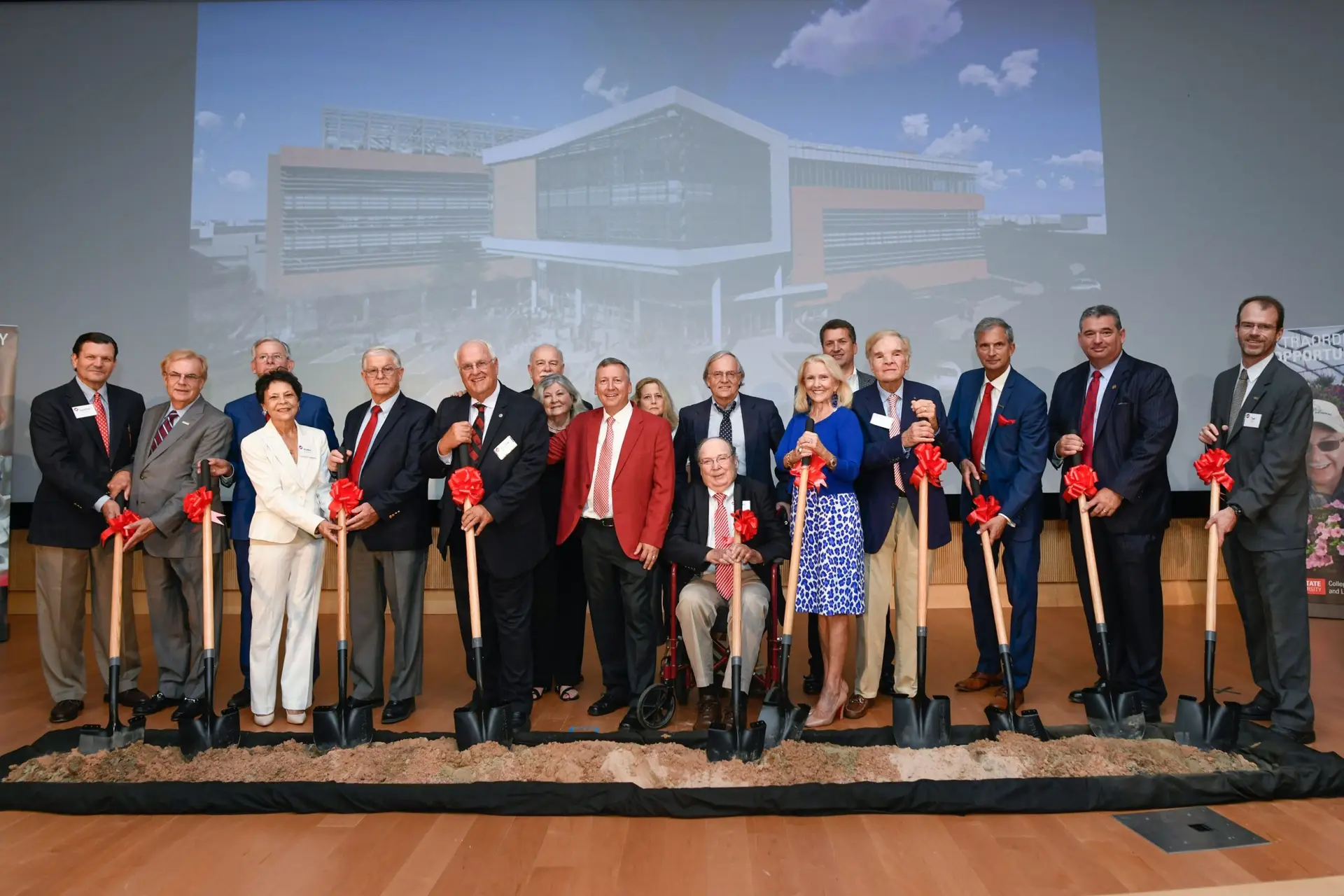The Golden LEAF Foundation joined approximately 400 supporters to help break ground on the Plant Sciences Initiative building on September 6, 2019 in a standing-room only ceremony at North Carolina State University. This project was the result of a common goal and partnership between many organizations, including the Foundation, to turn the vision for a world renowned innovative agricultural facility into reality.

On September 6, 2019, the Golden LEAF Board of Directors and other partners broke ceremonial ground on the N.C. Plant Sciences Initiative.
This facility will create opportunities to grow the state’s thriving agricultural industry into a global leader – by developing new products, conducting research and educating our next generations of agriculture industry employees for the jobs of the future. This public-private partnership will bring together the brightest minds in academia, government and industry to drive vital research and innovation that will increase crop yields, extend growing seasons, enhance agricultural and environmental sustainability, and produce new and improved technology.
The event took place a day after Hurricane Dorian grazed the northeastern coast of North Carolina prompting University officials to note that the timing was fitting because one of the benefits of the Plant Sciences Initiative is to make crops more resilient to natural disasters, including flooding and hurricanes.
Agriculture remains North Carolina’s top industry. Researchers have pointed to a rapidly growing population, loss of farmland, climate shifts, and emerging crop diseases as some of the complex agricultural challenges that do not fit into particular academic or research silos. The Plant Sciences Initiative aims to break down barriers to solving these and other major challenges.

NCSU Chancellor Randy Woodson spoke to a room of N.C. Plant Sciences Initiative supporters on September 6, 2019.
“This is a critical project for us to ensure that we’re always going to be there for our farmers and able to support them through the cutting-edge research that we do,” said NCSU Chancellor Randy Woodson. “It really continues to keep us at the forefront of plant science research, and it keeps North Carolina competitive in agriculture.”
Investing in the NCSU initiative is investing in rural North Carolina’s future, said Golden LEAF Board Chairman Randy Isenhower at the groundbreaking ceremony.

Golden LEAF Board Chair and NCSU alumni Randy Isenhower spoke at the ceremonial groundbreaking for the Plant Sciences Initiative.
“Supporting agriculture through innovation and research ultimately helps to grow rural communities,” Isenhower said. “This state-of-the-art facility and this initiative are the tools North Carolina’s farmers need to boost that growth. Most importantly, it will give our farmers and rural communities the edge in an increasingly competitive global market.”
In 2015, state lawmakers earmarked $85 million for the initiative as part of a statewide bond package. The Golden LEAF Foundation awarded a total of $48 million, the largest single contribution ever made to the College of Agriculture and Life Sciences and one of the largest in university history.
A total of 44 statewide commodity groups joined the effort, raising an additional $6 million for the Plant Sciences Initiative. Other partners include the U.S. Department of Agriculture and the NC Department of Agriculture and Consumer Services.

NCSU CALS Dean Richard Linton (center) talks with NCSU Chancellor Randy Woodson (left) and Golden LEAF Board Chair Randy Isenhower at the PSI groundbreaking ceremony at NCSU.
“We are better when we work together – and there is no better example of that than the North Carolina Plant Sciences Initiative,” said Richard Linton, Dean of the NCSU College of Agriculture and Life Sciences.
In 2013, Linton embarked on an agricultural tour around the state to learn the challenges and opportunities that farmers and other university stakeholders were facing – and what they expected in the future.
“North Carolina farmers were clear in their message that they were struggling,” said Linton. “To remain in business, they needed lasting agricultural solutions that included more resilient crops and better ways to manage those crops from pre-planting through to the marketing.”
These agricultural challenges are not specific to North Carolina. Experts around the world said that farmers need to double food production by 2050 to feed a growing global population – and they would likely have to do that with less land water and during a time when climate and weather conditions are changing.
“We will always be there for our farmers – supporting them through cutting-edge research they need and have come to expect from us,” said Woodson. “It will yield significant economic opportunities for our rural communities while providing food solutions to people around the globe.”
Construction began on the NCSU campus in April 2019, with plans to complete the building by late 2021.

